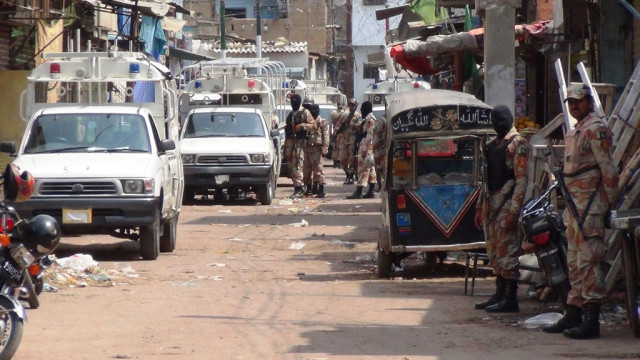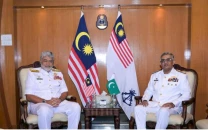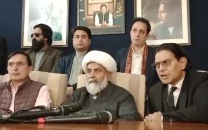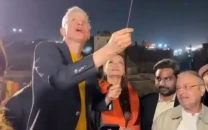How chief justice kickstarted the Karachi operation
Violence has gone down since the 90s, and a volunteer who picks up corpses in Karachi thanks CJ Iftikhar for that.

File photo of Rangers in Karachi. PHOTO: MOHAMMAD SAQIB
“The city’s mortuary ran out of space to accommodate more bodies. So, the moving mortuary provided additional space for 18 bodies,” Khursheed tells The Express Tribune, as he stands next to a Hino truck converted into a makeshift morgue.
The violence was the worst Khursheed has seen since he moved to the port city in the ‘90s. But it has ebbed slightly since then, and Khursheed thanks Chief Justice Iftikhar Chaudhry for that.
“The number of the killings has decreased since the Supreme Court took suo motu notice. But, neither the case nor the mayhem has ended,” says Khursheed. He says the number of bodies he collected during sixteen years of his volunteer job runs into the thousands.
August 21, 2011, the date Chaudhry took suo motu notice of the Karachi violence, injected breath into the dying hopes of the Karachiiites that their city would once again be peaceful.
Judicial Intervention
Daily life in Karachi was paralysed and commercial activities were at a standstill as violence would compel entire neighbourhoods to shut down and transport to halt in its tracks. Target killings were taking place on the streets every day, citizens were being kidnapped for ransom and street crimes were in the thousands.
The Supreme Court, as it has done many times, sprung to action. It saw that the Sindh government had failed to protect the life, liberty, dignity and freedom of the citizens of the city. A five-member bench headed by Chaudhry formally initiated proceedings. And it wanted to see accountability. Despite being consistently pressed over whose responsibility it was to protect the citizens of Karachi, police officials and bureaucrats obfuscated facts and pointed fingers instead of accepting responsibility.
While the truth from intelligence agencies was not forthcoming, the lawyers provided valuable information regarding the case. Former president of the Supreme Court Bar Association Asma Jahangir openly blamed all political parties and their militant wings for the chaos.As the proceedings concluded on September 14, the apex court authored a monumental 156-page judgment called the “Watan Party Case”. It contained 20 different orders, directions and observations, all intended to bring Karachi out of its cycle of violence. It was largely accepted. “This judgment is the better recipe,” remarked incumbent Advocate General Khalid Javed Khan. “It carries the solution to the multi-dimensional problem facing the city for a long time,” he added.
The apex court ordered the government to depoliticize its police force, launch an all-out operation without political interference; it urged political parties to denounce militant outfits; re-draw the revenue and administrative boundaries; abolish ‘no-go’ areas; cleanse the city of illegal weapons and register arms licenses with NADRA, punish land grabbers through effective legislation; protect witnesses; compensate families of the victims of target killings; document illegal migrants; protect businesses; re-open cases of the policemen killed in past operations in Karachi. A committee under the supervision of the Sindh High Court chief justice was also constituted to regularly review the law and order situation by holding meetings with the executive and law enforcers.
Implementation trouble
Unfortunately, Khursheed continues to collect corpses because the executive has failed to apply the remedy the judiciary had prescribed.Then Sindh High Court Chief Justice Mushir Alam continued to hold monthly meetings with executive authorities to review the situation, but officials showed little commitment.
“Instead of taking remedial measures the politicians continued their traditional meetings behinds closed doors for what they described as a policy of reconciliation,” a judicial officer who was part of the meetings told The Express Tribune. Killings continued unabated with every monthly death toll breaking previous records, and muggers patrolled the streets undeterred. After a year, the apex court decided to conduct follow-up proceedings to see how far the government had implemented its orders. On October 23, Chaudhry led a five-member bench once again. It grilled the federal, provincial and local authorities for not acting upon any of the court orders. “Every officer who stood on the rostrum says he just assumed his office. It sounded too foolish or funny for the high-ranking officers to be making such excuses,” a court clerk at the apex court told The Express Tribune, requesting not to be named. He spends days preparing the hundreds of files as part of the case.
The PPP government stalled in implementing Chaudhry’s recommendations, eventually making way for the PML-N government.After two years since the first suo moto notice, the judges conducted another review in August this year. The file of the case had gotten heavier. The SC proceedings looked more like a “Khuli Katchehri” as the citizens found it the only forum to make their individual complaints regarding their lands being grabbed, and loved ones being kidnapped or killed.
On September 4, the federal cabinet began the targeted operation under the supervision of the provincial Chief Minister Syed Qaim Ali Shah, and the cabinet belatedly began to implement the changes the judiciary had recommended. And Chaudhry can only feel vindicated after every recommendation was implemented.
The operation
The number of anti-terrorism courts swelled from merely three to 20 in Karachi alone for expeditious trials of the suspects with orders to arrest more than 100,000 absconders or proclaimed offenders.
The judges began to focus on how to cut the supply lines – the inflow of the black money that was fuelling the violence coupled with unabated supplies of illegal arms, ammunitions and contraband material.The scope of the judgment was widened and the chiefs of the Federal Board of Revenue, Customs, Maritime Security Agency, Pakistan Coast Guards and the Anti-Narcotics Force took charge. The federal government vowed to pass legislation aimed at controlling the flow of black money, smuggling of arms, contraband and tax evasion on imports.
On the last day of proceedings, Attorney General Sindh Khalid Javed Khan paid tribute to Chaudhry on behalf of the citizens of Karachi for “taking notice of the lawlessness to protect the fundamental rights of the people.”,Leaving for his chamber along with his four fellow judges,Chaudhry replied happily, “It is our constitutional commitment.” Khursheed says he is passionately waiting for the day when the corpses would cease and the court clerk says he prays for the day when he would send the piles of the files related to the Karachi suo motu case to the record room for good.

Published in The Express Tribune, December 11th, 2013.



















COMMENTS
Comments are moderated and generally will be posted if they are on-topic and not abusive.
For more information, please see our Comments FAQ